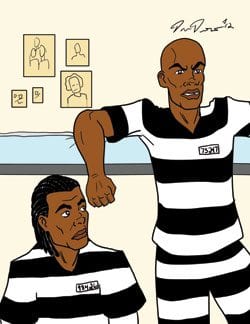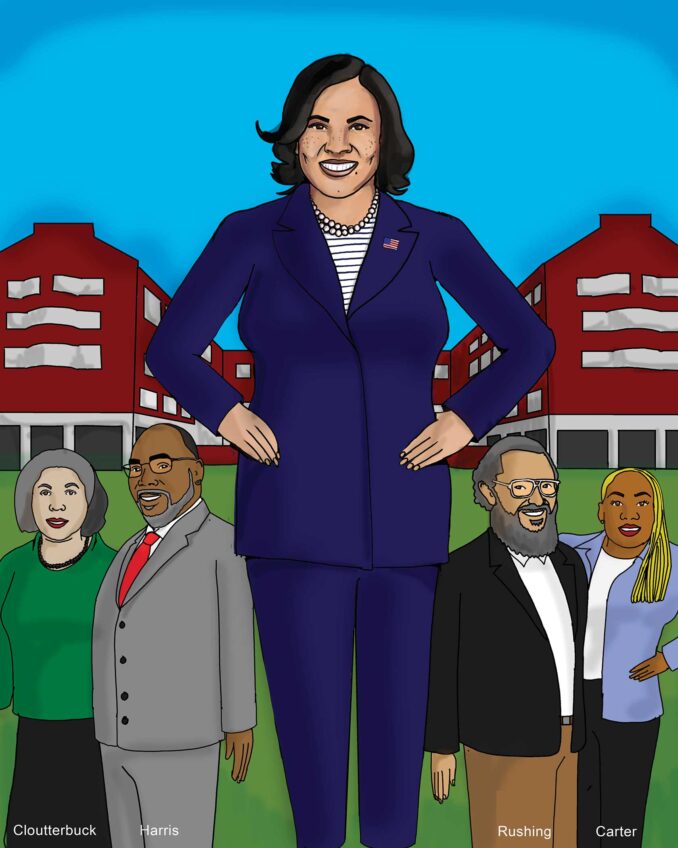
The new Jim Crow
| The U.S. prison population has exploded from 300,000 to more than two million over the course of the last 30 years. |
The inscription on the Great Seal of the United States is “E pluribus, unum” — from many, one. The ideal is that immigrants come to this country from all over the world, and regardless of their ethnicity and the peculiarities of their culture they are quickly transformed into Americans.
The belief is that America is the land of equal opportunity. There is no class structure to impede individual success. However, Michelle Alexander asserts in her book “The New Jim Crow: Mass Incarceration in the Age of Colorblindness” that the justice system has established a caste system that deprives blacks of the benefits normally available to other citizens.
Alexander’s views have provoked controversy because the concept of a social caste does not fit into the nation’s constitutional jurisprudence. Americans believe in the words of the Declaration of Independence that “all men are created equal.” The term “racial caste” in her book denotes “a stigmatized racial group locked into an inferior position by law and custom.”
Alexander cites slavery and Jim Crow as caste systems, and she adds to the list excessive imprisonment of blacks as felons, who upon release “are often denied the right to vote, excluded from juries, and relegated to a racially segregated and subordinated existence.” They can also be legally denied “employment, housing, and public benefits.” She asserts that this status is similar to the “segregated, second-class citizenship in the Jim Crow era.”
Critics of Alexander’s perspective claim that she is being soft on crime. However, she asserted that mass incarceration has “emerged as a stunningly comprehensive and well-disguised system of racialized social control that functions in a manner strikingly similar to Jim Crow.” She cites statistics on the drug trade and black imprisonment to support her claims.
In 1972, fewer than 350,000 people were imprisoned in the United States. Now that population has exploded to more than 2 million. Although data suggest racially equal use and sale of drugs, prisons have been filled with blacks convicted of drug offenses. A 2000 Human Rights Watch report found that 80 to 90 percent of drug offenders imprisoned in seven states were black. The evidence of disproportionality is substantial.
The most perplexing question is why some white Americans would want to use the war on drugs as a device for the social control of blacks? With slavery they got free labor. With Jim Crow they got suppression of the black vote. But with massive incarceration they get only the mounting cost of imprisonment and the growing government expense of social decay.
No hypothesis has made any sense, especially in the era of the recognition of black exceptionalism with the election of Barack Obama. Then an excerpt from “The Social Conquest of Earth” by famous Harvard Biologist Edward O. Wilson suggested an answer. Perhaps some whites are genetically primed to see blacks as the opposition.
According to Wilson, “Everyone, no exception, must have a tribe, an alliance with which to jockey for power and territory, to demonize the enemy, to organize rallies and raise flags.” If this is true, then some whites must see blacks as societally threatening outsiders intruding on their space.
The operation of the criminal justice system is not always “to protect and serve.” No competent police officer could possibly have believed that Harvard Professor Henry Louis Gates Jr. was a menacing burglar when he was arrested in his own home; or that Professor S. Allen Counter, with 30 years on the Harvard faculty was a flight risk and a danger to anyone, when he was arrested at his home to face bogus charges. Most blacks believe that white men of similar status would not have been summarily arrested.
Alexander’s book should have a profound impact on black leaders who have been wasting too much time running up dead ends. The battle going forward requires much greater sophistication than reliance on the strategies of the civil rights movement.






